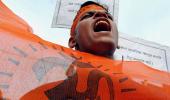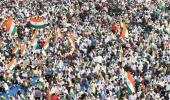Amid the furore over the Citizenship Amendment Act, the Union Cabinet on Tuesday approved funds to the tune of over Rs 3,941.35 crore for updating the National Population Register.
The government has decided to update the National Population Register along with the house-listing phase of Census 2021 from April to September 2020 in all the states/union territories, except Assam.
Here is all you need to know about the National Population Register and worries over its links with NRC.

What is National Population Register?
The NPR is a register of usual residents of the country.
It is being prepared at the local (village/sub-town), subdistrict, district, state and national level under provisions of the Citizenship Act, 1955 and the Citizenship (Registration of Citizens and Issue of National Identity Cards) Rules, 2003.
A usual resident is defined, for the purposes of the NPR, as a person who has resided in a local area for the past six months or more, or a person who intends to reside in that area for the next six months.
The law compulsorily seeks to register every citizen of India and issue a national identity card.
The NPR exercise will be carried out between April and September 2020 in all states and UTs, except Assam, along with the house listing phase of the census exercise.
Assam has been excluded because the National Register of Citizens exercise has already been conducted in the state.
The objective of the NPR, being carried out under the aegis of the Registrar General and ex-Officio Census Commissioner, India, is to create a comprehensive identity database of every usual resident in the country.
According to information and broadcasting minister Prakash Javadekar, no proof, no documents, no biometrics will be needed under it as it will be conducted through self-certification.
What is Census?
The decennial census is the largest single source of a variety of statistical information on different characteristics of the people of India conducted on the basis of the Census Act enacted in 1948.
The census, 2021 will be done in two phases. In the first phase, the work of house-listing or housing census will be conducted from April to September, 2020. In the second phase, the enumeration of population will be done from February 9 to February 28, 2021 with reference moment as 00:00 hours of March 1, 2021.
For snow-bound areas in Jammu and Kashmir, Himachal Pradesh and Uttarakhand, the reference date will be October 1, 2020.
The census is the basis for reviewing the country's progress in the past decade, monitoring the ongoing schemes of the government and plan for the future.
The census provides detailed and authentic information on demography, economic activity, literacy and education, housing and household amenities, urbanisation, fertility and mortality, scheduled castes and scheduled tribes, language, religion, migration, disability besides others.
The enumerators also collect data related to cultivators and agricultural labourers, their sex, occupational classification of workers in non-households industry, trade, business, profession or service by class of worker and sex.
There will be detailed survey on gender and literacy rate, number of towns, slum households and their population.
Information is also collected on sources of potable water, energy, irrigation, method of farming, whether a house is concrete, thatched or others.
With a history of more than 130 years, this reliable, time tested exercise has been bringing out a veritable wealth of statistics every 10 years, beginning from 1872 when the first census was conducted in India non-synchronously in different parts.
The government of India decided in May 1949 to initiate steps for developing systematic collection of statistics on the size of population, its growth, etc., and established an organisation in the Ministry of Home Affairs under Registrar General and ex-Officio Census Commissioner, India.
This organisation was made responsible for generating data on population statistics including vital statistics and census. Later, this office was also entrusted with the responsibility of implementation of Registration of Births and Deaths Act, 1969 in the country.
Is there any link between the NPR and NRC?
The NPR, since it is linked to the Census, is seen as the first step towards a nationwide exercise to implement the National Register of Citizens.
Though an NPR doesn't necessarily mean it's guaranteed there will be an NRC, it clears the path for a nationwide citizens' list.
This is seen as one of the reasons why some states like West Bengal and Kerala, which are opposed to the NRC, have stopped work on the NPR.
Legal experts and human activists fear the data collected by the NPR 2020 and Census of India 2021 will be used to identify Indian citizens or exclude usual residents who fail to prove their Indian citizenship based on documents mandated by the government, which, the government is yet to notify.
However, Javadekar said that the National Population Register has nothing to do with the NRC.
"The NPR has nothing to do with the NRC. It was a good move, first started in 2010 by the UPA government. We are just carrying it forward. The NRC was not mentioned in the Cabinet meeting," Javadekar said at a press conference.
Are the concerns over use of NPR to create NRIC unfounded?
While Union Cabinet ministers Prakash Javadekar and Piyush Goyal denied that the data collected by the NPR will not be used to determine the NRIC, Union minister of state for home Kiren Rijiju, replying to a question on the NRC by Rajen Gohain on July 22, 2014 had said (external link), “The Government has decided to create the National Register of Indian Citizens (NRIC) based on the information collected under the scheme of National Population Register (NPR) by verifying the citizenship status of all individuals in the country.”
Later, in 2015, replying to a question by former Lok Sabha MP from Gorakhpur Yogi Adityanath, MoS for home affairs, Haribhai Parathibhai Chaudhary had reiterated (external link) what Rijiju had said:
The Citizenship Act, 1955 provides the Central Government to compulsorily register every citizen of India and issue National Identity Card to him. It has been decided that National Population Register (NPR) should be completed and taken to its logical conclusion, which is the creation of National Register of Indian Citizen (NRIC) and National Identity Card would be issued to Citizens by verification of citizenship status of every usual resident in the NPR. The proposals for the same are under consideration of the Government.
With inputs from Prasanna D Zore/Rediff.com; PTI










